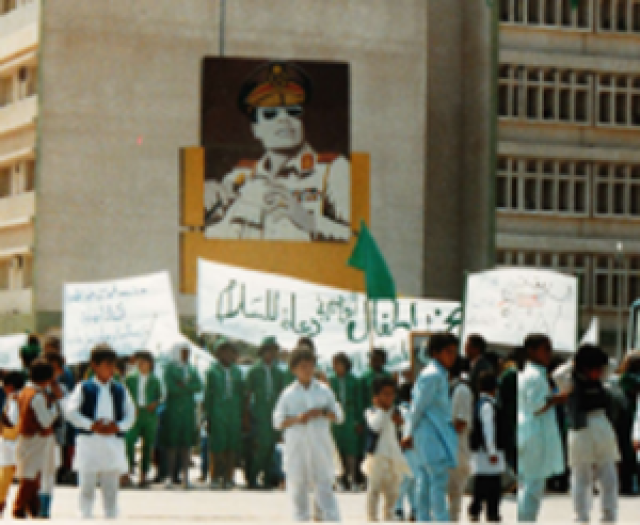
In 1987, I visited Libya as a journalist for the left-wing newspaper Direct Action. I visited Gaddafi’s bombed-out home — attacked by the United States one year earlier.
In the 1980s, the Gaddafi regime came under attack from the US government because it took an anti-imperialist line and gave financial and material aid to many national liberation movements at the time.
There were also some weird right-wing sects seeking, and sometimes obtaining, Libyan largesse. The Gaddafi regime also meddled disastrously and sometimes bloodily in factional disputes within the Palestinian liberation movement.
The Gaddafi regime said it provided its citizens with free education and health, though quality and access was uneven. Tellingly, Libyans who could afford it preferred to go to neighbouring Tunisia or Europe.
It provided its workers with some welfare, but did not allow unions. Nor did it treat its significant number of “guest” workers equally or fairly, some of whom were placed in
closed labour camps.
A bizarre personality cult around Gaddafi was obvious. There was a pretence at popular democracy through a system of “people’s congresses”, but these seemed to have only a nominal existence.
Gaddafi came to power in the 1969 revolution led by young military officers that overthrew pro-US King Idris.
Left commentator Tariq Ali dismissed the Gaddafi-led 1969 revolution in a February 22 British Guardian article as “all for show, like his ghosted science-fiction short stories”.
But there was a political revolution in 1969 that did result in the nationalisation of Libya’s oil industry. The broader redistribution of oil wealth contrasted sharply with practices in countries such as Saudi Arabia.
This was a nationalist revolution, similar to that led by Gamal Nasser in Egypt, whose government also called itself “socialist”.
The US and other imperialist governments saw this as an attack on their presumed right to exploit Libya’s oil resources.
David Mack, a former US diplomat and state department official, explained how the US reacted to the 1969 revolution in the January 2011 Foreign Service Journal: “By 1969, the US and British air bases in Libya were of declining strategic importance, but Tripoli had become a producer of energy vital to the economies of our West European allies and profitable for American companies.
“While the US still enjoyed a cozy relationship with an aging monarch and his sclerotic political system, Libyan popular attitudes were not isolated from the rest of the Arab world … This set the stage for the Libyan Revolution of September 1, 1969.
“Eventually, US policy adapted to these new realities … Much later, during the Reagan administration, the US supported and provided some military training to Libyan emigre opponents of the Gaddafi regime. They proved unreliable.”
Former US secretary of state Henry Kissinger said in his memoirs that the Nixon government had prepared a covert program to assassinate Gaddafi and other leaders of the 1969 revolution.
However, this was abandoned because big oil companies such as Exxon and Mobil preferred to cut a deal with the regime — albeit on tougher terms.
The Gaddafi regime has come a long way since then.
It has increasingly betrayed the promises and gains of the 1969 revolution.
The International Monetary Fund said in a February 15 report: “An ambitious program to privatise banks and develop the nascent financial sector is underway. Banks have been partially privatized, interest rates decontrolled, and competition encouraged.
“Ongoing efforts to restructure and modernize the Central Bank of Libya are under way with assistance from the Fund…"
The IMF noted positively the “passing in early 2010 of a number of far-reaching laws bodes well for fostering private sector development and attracting foreign direct investment”.
The report said: “Recent developments in neighboring Egypt and Tunisia have had limited economic impact on Libya so far.”
The IMF will have to eat that prediction. The stifling political repression (fiercest in Libya’s impoverished east), as well as the corruption, nepotism and flamboyant lifestyles enjoyed overseas by Gaddafi’s children, have proved too much.
And the stirring example of the youth of Tunisia, Egypt, Bahrain, Algeria, Yemen, Jordan, Sudan and Djibouti provided the spark.
What has led to this new Libyan revolution is the degeneration of the regime born of the 1969 revolution into “crony capitalism”.
The popular character of the new revolution is undeniable, but it is far from clear what sort of regime will emerge out of it.
The same greedy and powerful Western interests that first attacked and then propped up the Gaddafi regime are preparing for a change of tack — including considering direct military intervention.
As the 19th Century British Prime Minister Lord Palmerston famously observed: “We have no eternal allies, and we have no perpetual enemies. Our interests are eternal and perpetual…”
Hopefully the makers of the new Libyan revolution will heed the lessons of their own history.
Comments
Anonymous replied on Permalink
peter.g.boyle@g... replied on Permalink
Anonymous replied on Permalink
Anonymous replied on Permalink
Anonymous replied on Permalink